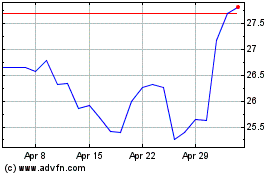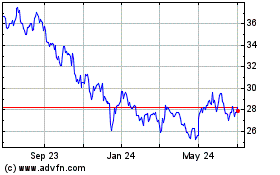Pfizer Fined $107 Million for Epilepsy Drug Price Hike in UK -- Update
December 07 2016 - 5:17AM
Dow Jones News
By Denise Roland
LONDON-- Pfizer Inc. has been fined GBP84.2 million ($106.7
million) by the U.K.'s competition regulator for charging the
country's National Health Service excessively high prices for an
anti-epilepsy drug.
The Competition and Markets Authority said Wednesday that Pfizer
and drug distribution company Flynn Pharma broke competition law by
charging unfair prices in the U.K. for phenytoin sodium capsules,
an anti-epilepsy drug used by around 48,000 patients in the
country.
The regulator fined Flynn Pharma GBP5.2 million ($6.6 million)
and has ordered both companies to reduce their prices.
A spokeswoman for Pfizer said the company refuted the CMA's
findings and would appeal all aspects of the decision. Flynn Pharma
couldn't immediately be reached for comment.
The CMA said the price of a 100mg pack of phenytoin sodium shot
up--to GBP67.50 from GBP2.83--after Pfizer sold the rights to sell
the drug to Flynn Pharma in September 2012. It said the price
decreased to GBP54 in May 2014. Before the agreement, Pfizer had
sold phenytoin sodium capsules directly to U.K. wholesalers and
pharmacies under the brand name Epanutin.
The price increase was partly because Pfizer, which continued to
manufacture phenytoin sodium, sold the drug to Flynn Pharma at up
to 17 times the price than it charged wholesalers and pharmacies
previously, the regulator said. Flynn Pharma hiked the price
further still.
The regulator said Pfizer and Flynn Pharma "deliberately
debranded" the drug in 2012 to raise its price. In the U.K., the
price of branded drugs is determined by negotiations between the
government and pharmaceutical companies. But unbranded, or generic
drugs, may be freely priced. Typically, generic drugs cost a
fraction of the branded version because there tend to be several
competing suppliers, but in this case, no other company made
phenytoin sodium.
A spokeswoman for Pfizer said the company "approached this
divestment with integrity and believes it fully complies with
established competition law."
She said phenytoin capsules were loss-making for Pfizer before
the deal with Flynn Pharma and the transaction secured ongoing
supply of the medicine. The spokeswoman added that the price
charged by Flynn Pharma was 25-40% lower than that for an
equivalent, branded epilepsy medicine whose price was
regulated.
Philip Marsden, the chairman of the case decision group for the
CMA investigation, said the companies "deliberately exploited the
opportunity offered by de-branding to hike up the price of a drug
which is relied upon by many thousands of patients."
Although Pfizer said the drug was loss-making before
de-branding, the losses would have been recovered within two months
of the price rises, Mr. Marsden said.
"There is no justification for such rises when phenytoin sodium
capsules are a very old drug for which there has been no recent
innovation or significant investment," he said.
Write to Denise Roland at Denise.Roland@wsj.com
(END) Dow Jones Newswires
December 07, 2016 05:02 ET (10:02 GMT)
Copyright (c) 2016 Dow Jones & Company, Inc.
Pfizer (NYSE:PFE)
Historical Stock Chart
From Mar 2024 to Apr 2024

Pfizer (NYSE:PFE)
Historical Stock Chart
From Apr 2023 to Apr 2024
